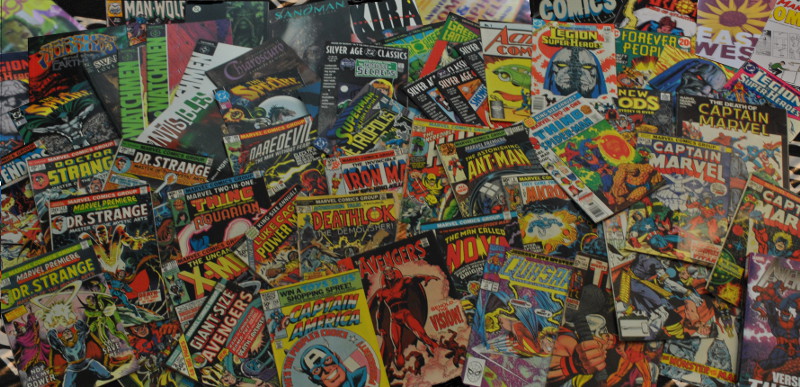Goodbye for Now
For over the past four years, I’ve blogged regularly about comics, with topics ranging from story generation, to the business side, to critiques and reviews, to organization and cataloging, and even a post on coloring. I’ve enjoyed the experience and learned a lot, but today I am bringing that effort to a close – at least for the foreseeable future.
There are many reasons for mothballing this effort but primary amongst them are that I’ve said about all I want to about the older stories and that the newer stories hold neither my head nor my heart.
First, let me address the topic of the older tales told in days gone by. Of course, there are plenty of classics that I haven’t covered but the prospect of trying to find every unexplored nook and cranny in a structured way doesn’t enthuse me. The thrill of revisiting these just isn’t there and I don’t know if it will ever return. This ennui is largely the result of a sorry state of affairs in the current incarnation of comics and perhaps it is unfair to tarnish the spirit and reputation of those stories by association with the modern line, but there it is.
Second, let me address the topic of the newer material. While there have been some gems in the past decade or so, the overall sense of fun and adventure and individual achievement is largely gone. Comics are now ‘woke’ and not for the best. Instead of inspiring stories of individual achievement that speak to all of us, modern stories present uninspiring stories of no achievement that speak to only a few of us at a time and only on those subjects that divide us. The most common themes are dominated by an incessant gloom of psychoanalysis, intersectionality and political correctness that hovers over everything. Good stories are universal even when they are about specific people doing specific things. Bad stories are divisive even when speaking of universal things. Today’s stories are bad stories.
G.K. Chesterton, who wrote his own share of fantastic fiction, is best known for his Father Brown mysteries. These stories are good because they deal with common situations that exemplify what it is to be human – love, hate, greed, fear, ambition, sacrifice, faith, and doubt. None of these stories try to embrace the world at large but rather content themselves with small, cozy interactions. The reader need not be British or French, or Catholic or Protestant, or a Capitalist or a Socialist, or have lived at the turn of the Twentieth Century to relate to what he reads. Dale Alquist, head of the American Chesterton Society, explains Chesterton’s approach by noting that Chesterton objected to mystery stories involving international intrigue and spy drama because he felt the real drama should always be centered on what a man does and why he does it. It is more interesting to find out why one man murdered another than it is to find out how he did it. The universality of man that Chesterton tapped into in his tales transcends notions of race, religion, and other such labels and, instead, focuses on the soul.
The creators of Greek mythology embraced these ideas as well. I’ve never sailed the Mediterranean nor picked up a Hoplite’s sword nor sacrificed a bull to the Olympian gods and yet I can relate to Homer and Euripides and Sophocles and Plato and Aristotle. The time and situations are all trappings that can be put on or taken off as needed. But the rage of Achilles from his public humiliation at the hand of Agamemnon is understandable to all. The bravery of Hector in facing an enemy clearly his superior can be admired by the weak as well as the strong. The cleverness of Odysseus in tricking the Trojans to admit the Greeks hidden in that famous wooden horse can be savored by everyone.
The writers of the movie Alien also embraced these ideas. Ellen Ripley, played so ably by Sigourney Weaver, is an admirable character. Her tenacity, alertness, resourcefulness, and plain old smarts make her an ideal role model independently of her sex. Her struggle against nearly impossible odds makes her success all that sweeter for men and women alike.
Even Shakespeare’s Danish prince, the ever-doubting Hamlet, is an admirable fellow. His zealousness in finding the truth of his father’s death and his shear intellect in pursuing this goal transcends the mere accident of his birth into the court of Denmark. His internal conflict is understandable to anyone ever faced with a hard and uncertain choice.
In all of these good tales, we find souls we can relate to, that we can admire, or with whom we can sympathize. We can do so in spite of their particular station in life or circumstances in which they find themselves. In today’s comics we find weak-willed, unsympathetic characters with no soul and for whom the only interest is generated by their station or their circumstances.
Modern comics regale us with banal speech instead or noble action, confuse us with obscurity rather than provoke us with profundity, and, above all else, present us with a world where our heroes are lesser than ourselves.
So, good-bye for now…
